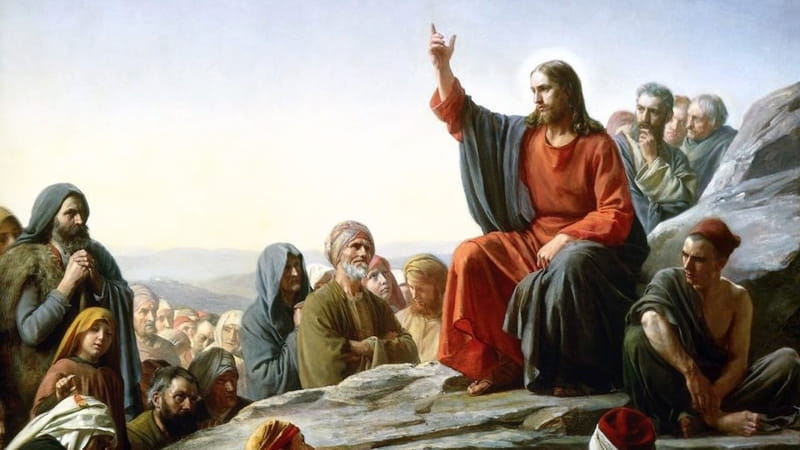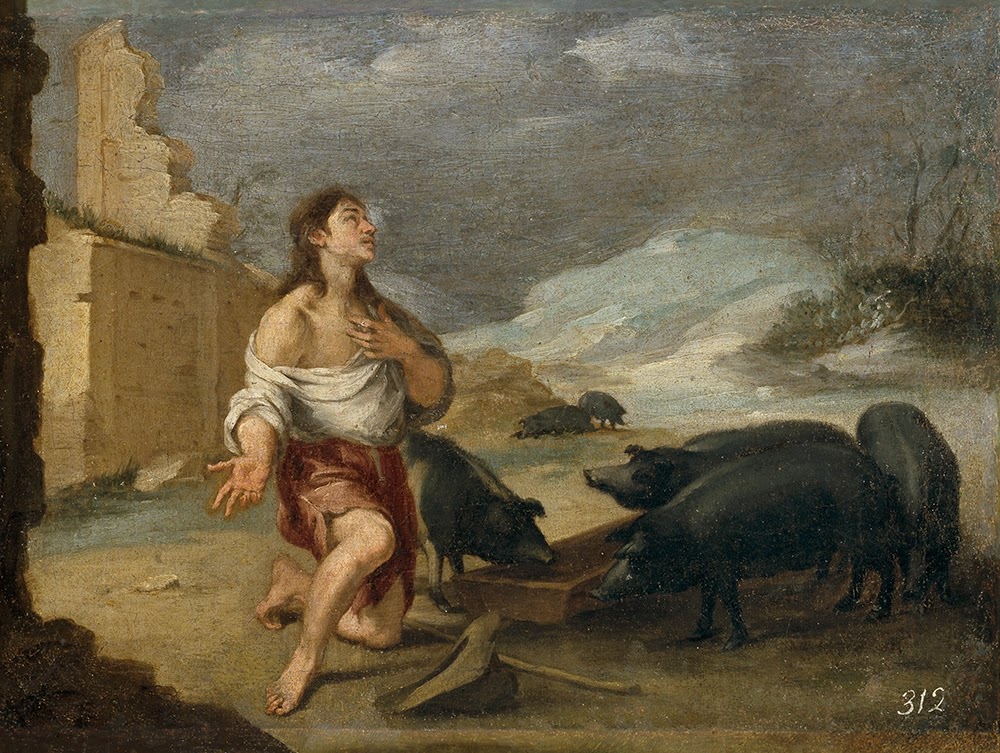7th Sunday of the Year (C)
In the wake of the Super Bowl, I’d like to begin this morning’s homily by making reference to one of the greatest press conferences ever given by a sports personality. In 2002, Herm Edwards, then the coach of the New York Jets, famously told the camera: “You play to win the game. You don’t play it just to play it… You play to win the game!”
What Coach Edwards said about football is also true of the Christian life. The reason we play the game––that is, why we live the Christian life, with all of its demands––is to win the game, to be saved. As with any game, in order to win, you have to follow certain rules, and Christianity is no different. In the twelve verses of today’s Gospel, Jesus lays down, on my count, seventeen such rules: love your enemies, do to others as you would have them do to you, be merciful, et cetera. Elsewhere, Jesus instructs us that we need to keep his commandments to remain in his love (cf. Jn. 15:10) and that, if we remain in his love, he will come again and take us to himself, to the place he has prepared for us in heaven (cf. Jn. 14:3). Our salvation, therefore, hinges upon our keeping of Jesus’ commandments. In order to win the game, we must play it.
But, my brothers and sisters, what if there is another way to win the game? One that does not require one to play it? What if one can be saved without following Jesus’ commandments? Without being a Catholic? Without being a Christian? Without believing in God? Where would that leave the Christian life and all its commandments?
In fact, the Church teaches (hold onto your pews!) that it is possible for all of the above to be saved. In support of that, I would quote to you just the Catechism of the Catholic Church, paragraph 1260, on the necessity of baptism: “Every [person] who is ignorant of the Gospel of Christ and of his Church, but seeks the truth and does the will of God in accordance with his understanding of it, can be saved.”
If it’s the case, then, that one can be saved without living the life of the Gospel, then why should webother living it? Moreover, if the rules of the Christian life are especially demanding (and they are), and the rules of other ways of life are exceptionally easier (and they are), then why on earth would we choose to play this game instead of any other, if we could otherwise attain the same victory, our salvation? And if we do choose to live by these rules, how quickly they become burdensome, when it seems that God, as a cruel tyrant, has imposed these mandates on us and not on others, who have it much better off! Think of how much easier life would be if you didn’t have to love the person who wronged you, hurt you, or cheated you. Or, think of what you could say or do to the person who cuts you off in traffic, without the weight of being Christian holding you back!
As the modern world praises free choice above all else, we have to honestly ask ourselves why we would choose to be Christian over and against all other options. I would argue that the only way we’ll be able to convince anyone that the Christian life is worth living is if we are able to articulate why we choose to believe the Gospel when it would so much easier not to, especially when, on the surface, not believing the Gospel would be no less detrimental to our hope of eternal salvation.
To do so, I think there are essentially four moves to make.
1) We don’t really have a choice. We are Christians because God has called us to be Christians. We have fundamentally no right to act against what God wants for us. While, yes, it is possible for non-Catholics to be saved––for those who have been called and fully initiated into the Church that Christ founded, there’s really no other option for us to be saved. The Second Vatican Council taught that “they could not be saved who, knowing that the Catholic Church was founded as necessary by God through Christ, would refuse to either to enter it or to remain in it.” To quote a friend, the Catholic Church is like the mafia. Once you’re in, you’re in. There’s no getting out.
2) God has called us to be members of the Church but not others. Jesus says elsewhere that “Many are called but few are chosen.” We are the “few”, while the “many” are those he has not chosen for his Church, yet he still calls. God desires to save all people, but it seems that he does so in two ways. He calls some (the “few”) to be members of his Church, while the “many” he does not. Yet, it seems that God desires to save the “many” by the ministry of the “few”, which leads me to the third move.
3) Think of all the good that is done in the world because of the fact that people take seriously those seventeen rules that Christ gives to his disciples in today’s Gospel and so many others. We know all too well that not everyone strives to love their enemies, to give generously beyond the measure of justice, and to think of others before they think of themselves. But even if only a few people in the world authentically live this way, does that not benefit the many and, perhaps, lead them closer to salvation? Jesus calls his disciples (which includes us) leaven and even a little leaven causes the dough to rise. He also calls us the light of the world. How many times, in the most desolate moments of human history, have there been Christians present to reflect the light of Christ to shatter the darkness!
4) Finally, the demands of the Christian life, however heavy, bear fruit, not only for others but also for ourselves; and in this, the burden becomes light. At the end of today’s Gospel, we read: “Give, and gifts will be given to you; a good measure, packed together, shaken down, and overflowing, will be poured into your lap. For the measure with which you measure will in return be measured out to you.” In short, when we give, we receive––and the measure that we receive always exceeds what we have given.
So, in the final analysis, Herm Edwards’ wisdom does not entirely translate to the Christian life. You may play football to win the game; but we don’t simply live the Christian life for us to be saved. Rather, we embrace all that Christ commands us to do so that others may be saved by us cooperating with God’s grace to be the leaven that raises them up and the light that shatters the darkness that oppresses them. And as we do, we find that we are fulfilled in abundance for all we have spent until the last day, when, please God, we will be welcomed, along with all those who we bought along the way, into the kingdom of heaven prepared by Christ for those who remain in his love.
–––
Editorial note: The central dilemma posed in this homily, as well as part of my proposed way out of it, is derived from Joseph Ratzinger's 1958 lecture entitled "The New Pagans and the Church".

-1.jpg)


Comments
Post a Comment